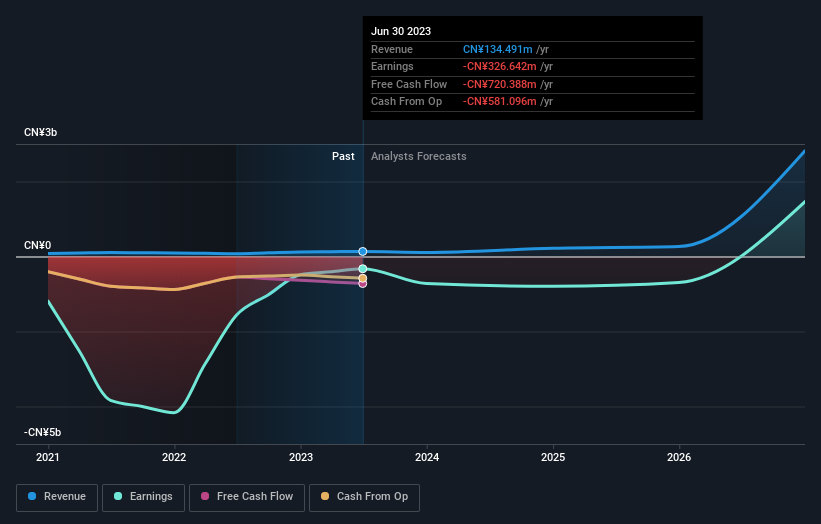Stock Analysis
Institutions along with individual investors who hold considerable shares inBrii Biosciences Limited (HKG:2137) come under pressure; lose 11% of holdings value

Key Insights
- Brii Biosciences' significant individual investors ownership suggests that the key decisions are influenced by shareholders from the larger public
- 51% of the business is held by the top 10 shareholders
- Institutional ownership in Brii Biosciences is 28%
Every investor in Brii Biosciences Limited (HKG:2137) should be aware of the most powerful shareholder groups. And the group that holds the biggest piece of the pie are individual investors with 45% ownership. In other words, the group stands to gain the most (or lose the most) from their investment into the company.
While the holdings of individual investors took a hit after last week’s 11% price drop, institutions with their 28% holdings also suffered.
Let's delve deeper into each type of owner of Brii Biosciences, beginning with the chart below.
Check out our latest analysis for Brii Biosciences

What Does The Institutional Ownership Tell Us About Brii Biosciences?
Many institutions measure their performance against an index that approximates the local market. So they usually pay more attention to companies that are included in major indices.
As you can see, institutional investors have a fair amount of stake in Brii Biosciences. This suggests some credibility amongst professional investors. But we can't rely on that fact alone since institutions make bad investments sometimes, just like everyone does. If multiple institutions change their view on a stock at the same time, you could see the share price drop fast. It's therefore worth looking at Brii Biosciences' earnings history below. Of course, the future is what really matters.

Brii Biosciences is not owned by hedge funds. The company's largest shareholder is Arch Venture Partners, L.P., with ownership of 12%. In comparison, the second and third largest shareholders hold about 9.9% and 4.6% of the stock. Additionally, the company's CEO Zhi Hong directly holds 4.5% of the total shares outstanding.
We also observed that the top 10 shareholders account for more than half of the share register, with a few smaller shareholders to balance the interests of the larger ones to a certain extent.
While studying institutional ownership for a company can add value to your research, it is also a good practice to research analyst recommendations to get a deeper understand of a stock's expected performance. There is some analyst coverage of the stock, but it could still become more well known, with time.
Insider Ownership Of Brii Biosciences
The definition of company insiders can be subjective and does vary between jurisdictions. Our data reflects individual insiders, capturing board members at the very least. Management ultimately answers to the board. However, it is not uncommon for managers to be executive board members, especially if they are a founder or the CEO.
Insider ownership is positive when it signals leadership are thinking like the true owners of the company. However, high insider ownership can also give immense power to a small group within the company. This can be negative in some circumstances.
Our most recent data indicates that insiders own some shares in Brii Biosciences Limited. In their own names, insiders own HK$55m worth of stock in the HK$1.2b company. It is good to see some investment by insiders, but we usually like to see higher insider holdings. It might be worth checking if those insiders have been buying.
General Public Ownership
The general public-- including retail investors -- own 45% stake in the company, and hence can't easily be ignored. While this size of ownership may not be enough to sway a policy decision in their favour, they can still make a collective impact on company policies.
Private Equity Ownership
With a stake of 22%, private equity firms could influence the Brii Biosciences board. Some investors might be encouraged by this, since private equity are sometimes able to encourage strategies that help the market see the value in the company. Alternatively, those holders might be exiting the investment after taking it public.
Next Steps:
I find it very interesting to look at who exactly owns a company. But to truly gain insight, we need to consider other information, too. For example, we've discovered 1 warning sign for Brii Biosciences that you should be aware of before investing here.
Ultimately the future is most important. You can access this free report on analyst forecasts for the company.
NB: Figures in this article are calculated using data from the last twelve months, which refer to the 12-month period ending on the last date of the month the financial statement is dated. This may not be consistent with full year annual report figures.
Valuation is complex, but we're helping make it simple.
Find out whether Brii Biosciences is potentially over or undervalued by checking out our comprehensive analysis, which includes fair value estimates, risks and warnings, dividends, insider transactions and financial health.
View the Free AnalysisHave feedback on this article? Concerned about the content? Get in touch with us directly. Alternatively, email editorial-team (at) simplywallst.com.
This article by Simply Wall St is general in nature. We provide commentary based on historical data and analyst forecasts only using an unbiased methodology and our articles are not intended to be financial advice. It does not constitute a recommendation to buy or sell any stock, and does not take account of your objectives, or your financial situation. We aim to bring you long-term focused analysis driven by fundamental data. Note that our analysis may not factor in the latest price-sensitive company announcements or qualitative material. Simply Wall St has no position in any stocks mentioned.
About SEHK:2137
Brii Biosciences
Engages in the research and development of therapies for the treatment of infectious and central nervous system diseases in China and the United States.
Flawless balance sheet low.

